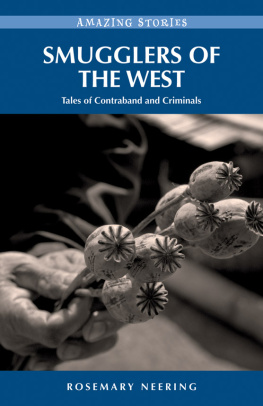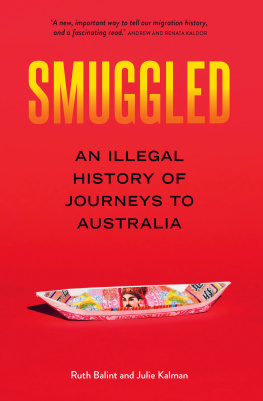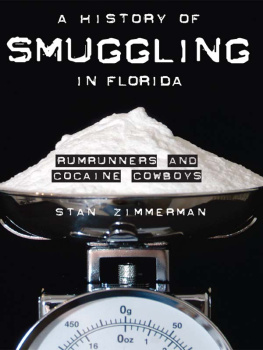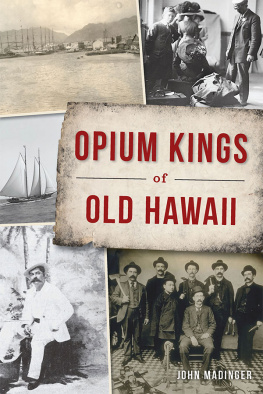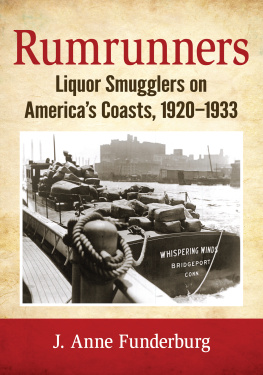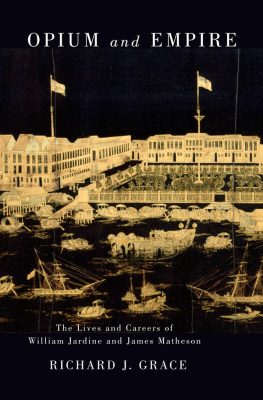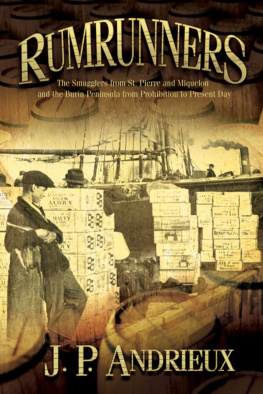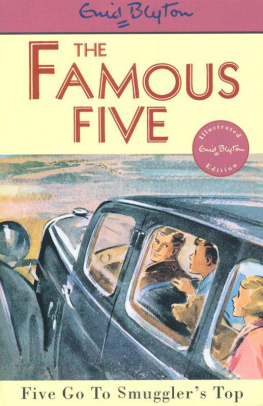Smuggling on North Americas west coast has a long and complex tradition, one with a plethora of tales and legends, some of them true and some owing more to the tellers imagination than to verifiable fact. Sorting out truth from fantasy has been a fascinating task, and I owe much to those writers and historians who tackled that task before me.
The books and writers to whom I owe a debt are listed in the bibliography. Much material is now online, in the form of reports, essays, newspapers and family histories, among other sources. I thank those who took the time and expended the energy required to create these digital resources.
I am particularly grateful to all those in the distant past and up to the present who loved good smuggling stories. I know that todays smuggling of drugs and people causes untold harm, and I do not mean to downplay that harm. The West Coast smugglers of the past, howeverwith some notable exceptionsseem to have caused less destruction, and though I do not glorify their actions, I present their stories with that in mind.
I thank Heritage House managing editor Vivian Sinclair for the opportunity to write this book, and editor Lesley Reynolds, who once more did a fine job of sorting out inconsistencies and restraining wordiness.
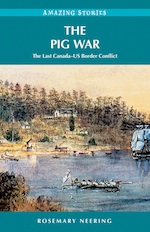
The Pig War
The Last CanadaUS Border Conflict
Rosemary Neering
On May 15, 1859, an American settler on San Juan Island shot a pig belonging to the Hudsons Bay Company. This seemingly insignificant act almost triggered an all-out war between Britain and the United States on the northwest coast of North America. At stake was control of the strategically located San Juan Islands, and as both sides mustered their forces, conflict seemed inevitable. This lively account of the border dispute now known as the Pig War traces the events that led to the standoff in the San Juans and brings to life the memorable characters who played leading roles in the drama.
Visit www.heritagehouse.ca to see the entire list of books in this series.
Rosemary Neering has been writing about the Pacific Northwest for more than three decades. She is the author of many books on the area, including British Columbia Bizarre: Stories, Whimsies, Facts, and a Few Outright Lies from Canadas Wacky West Coast; Down the Road: Journeys through Small-Town British Columbia; Wild West Women: Travellers, Adventurers and Rebels; and A Travellers Guide to Historic British Columbia, as well as The Pig War in the Amazing Stories series. She is fascinated by the offbeat and lesser-known stories of the region. Rosemary lives in Victoria with her partner, Joe Thompson, and her cat, but makes frequent forays into the backwoods.
Bibliography
Books
Bancroft, Hubert Howe. History of British Columbia. Los Angeles: A.L. Bancroft & Company, 1887.
Fahey, Edmund. Rum Road to Spokane. Missoula: University of Montana, 1972.
Greene, Hilda. Personality Ships of British Columbia. West Vancouver, BC: Marine Tapestry Publications, 1969.
Kahn, David. The Codebreakers. New York: Simon and Schuster, 1996.
Norton, Wayne and Naomi Miller, eds. The Forgotten Side of the Border. Kamloops: Plateau Press, 1998.
Parker, Marion and Bob Tyrell. Rumrunner: The Life and Times of Johnny Schnarr. Victoria: Orca Books, 1988.
Richardson, David. Pig War Islands. Eastsound: Orcas Publishing Company, 1990.
Schneider, Stephen. Iced: The Story of Organized Crime in Canada. Toronto: John Wiley and Sons, 2009.
Wilson, Gary. Honky-Tonk Town: Havre, Montanas Lawless Era. Guilford, CT: Globe Pequot Press, 2006.
Articles and Reports
Cameron, James D. Canadas Struggle with Illegal Entry on Its West Coast. BC Studies 146 (Summer 2005): 3762. Also available online at http://ojs.library.ubc.ca/index.php/bcstudies/article/view/1757/1802.
Griffith, Sarah M. Border Crossings: Race, Class and Smuggling in Pacific Coast Chinese Immigrant Society. Western Historical Quarterly 35, no. 4 (Winter 2004): 47392.
Mackenzie King, W.L. The Need for the Suppression of the Opium Traffic in Canada. Ottawa: Department of Labour, 1908. Also available online at www.archive.org/stream/reportbywlmacken00canarich#page/n1/mode/2up.
Montgomery, Gary. Booze Across the Border. Tobacco Plains Journal 6, no. 2 (September 1997).
Ralph, Julian. The Chinese Leak. Harpers New Monthly Magazine, March 1891.
Newspapers
British Colonist (Daily British Colonist, Daily Colonist) (Victoria)
New York Times
Oregonian (Portland)
Vancouver Daily World
Vancouver Sun
Websites
Chinese in Northwest America Research Committee. www.cinarc.org.
Colonial Despatches: The Colonial Despatches of Vancouver Island and British Columbia 18461871.http://bcgenesis.uvic.ca/index.htm.
CHAPTER
In the Beginning
Shuffling along the narrow trail, the prospector shifted his heavy pack to a more comfortable position. Up ahead, he knew from talking to like-minded men, lay the border between the Oregon Territory and the newly named colony of British Columbia. He knew, too, what to expect when he arrived at the border, but he had no intention of letting it happen to him. By God, and by my rights as an American, he growled to himself, Im not paying any duties on my gear. They can whistle for their money. Ill wait till dark and slip across the border when theyre sleeping. Ill be miles away before the customs man even wakes up.
The story is apocryphal, but it represents many a man who headed north for the various gold rushes in British Columbia from 1858 on. One of the first things Governor James Douglas did after assuming the post of governor of the mainland colony was to set customs duties on anything imported into the region. How else, he and other colonial officials asked, could the colony afford to build roads and keep the law? As one official wrote to the colonial secretary in London, expenses such as these could be paid by a small ad valorem duty on British imports, with an increase upon foreign imports, &, suggesting a policy that would always be popular with governments, a considerable augmentation on ardent spirits in proportion to their proof. No revenue could be raised sufficient for present purposes, by any other means so readily... and at so small an expense to the mother country.
With the first customs duties came the first smugglers. Though Victoria was a free port for a few years from 1860 on, no such benefits accrued to New Westminster and other mainland points, and gold rushers who came by land preferred to evade duties whenever they could. In his 1887 history of British Columbia, Hubert Howe Bancroft reported the result:
Smuggling was practised largely from the first appearance of the gold fever. Particularly along the United States border it was found impossible, where all was hurry and helter-skelter, and goods were carried on mens backs as well as by horses and canoes, to prevent large quantities of merchandise from passing the line untaxed. So great became this contraband traffic that a serious commercial depression which prevailed at New Westminster in the winter of 18601 was charged directly to it.
In 1859, two American soldiers escaped pursuing Natives by scuttling north across the border in the country east of present-day Osoyoos, where they chanced upon gold in the Kettle River. Soon, some 5,000 prospectors were streaming north, and not one of them was paying duty on the goods and supplies he carried. James Douglas added a second customs officer to the area, for restraining the illicit importation of goods into British Columbia, but it was to no avail. It is, however, impossible, I conceive, wrote Douglas, altogether to prevent smuggling at places situated so immediately on the frontier as Rock Creek. As a Portland newspaper noted in December 1860, in a report from Rock Creek:

